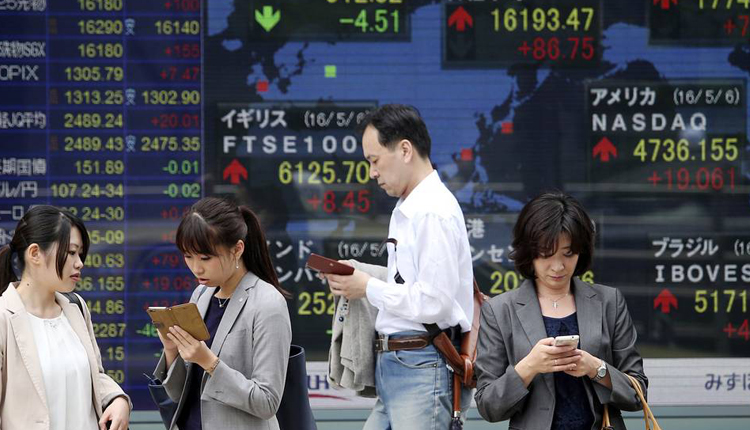Asian stocks were trading lower on Thursday afternoon as investors remained cautious after U.S. President Donald Trump claimed China “broke the deal” in the ongoing trade negotiations between Beijing and Washington.
In China, both the Shanghai composite and Shenzhen component declined more than 1.3% each by the end of the morning session. The Shenzhen composite fell 1.033%, while Hong Kong’s Hang Seng index was down 1.95%.
Japan’s Nikkei 225 was lower by about 1% and the Topix index slipped 1.21%. Shares of automaker Honda Motor fell more than 4% despite the company forecasting a 6% increase in operating profit for the current fiscal year.
South Korea’s Kospi shed 1.61% as shares of chipmaker SK Hynix plunged more than 4%.
The ASX 200 in Australia, meanwhile, bucked the downward trend to increase by 0.48% as most sectors rose.
One investor urged others to “take a step back” for now amid the market volatility in the past week.
“Take the money off the table, sit on the sideline … let the picture clear up a bit and i think you will get a better sense of where (these) markets are headed,” Haren Shah, managing director and head of investments at Taurus Wealth Advisors.
Addressing his supporters at a rally in Florida, Trump blamed Beijing for the breakdown in trade talks which led to his recent threat to increase tariffs.
“By the way, you see the tariffs we’re doing? Because they broke the deal. They broke the deal,” Trump said. “So they’re flying in, the vice premier tomorrow is flying in — good man — but they broke the deal. They can’t do that, so they’ll be paying.”
But one analyst expressed concern.
“We are not sure who the president is addressing tonight in a campaign rally, but he is sure scaring the daylights out of the financial markets,” Chris Rupkey, managing director and chief financial economist at global financial group MUFG, wrote in a note following Trump’s speech.
“One thing is certain, if the U.S. raises tariffs on the last $200 billion of imports from China from 10% to 25% then this spells disaster for the U.S. economy,” Rupkey said. “We have never been so close to recession’s door simply based on the policies from Washington.”
Markets have been rattled for much of this week after Trump said in a Twitter post Sunday that the U.S. would raise tariffs on Chinese goods as soon as Friday, a move that was unexpected by investors who had priced in the possibility of a trade deal being reached between the two economic powerhouses.
The U.S. dollar index, which tracks the greenback against a basket of its peers, was at 97.613 after seeing lows below 97.5 yesterday.
The Japanese yen, widely seen as a safe-haven currency, traded at 109.95 against the dollar from levels around 110.9 seen earlier in the trading week. The Australian dollar was at $0.6974 after slipping from levels above $0.7 yesterday.
Oil prices declined in the afternoon of Asian trading hours, with the international benchmark Brent crude futures and and U.S. crude futures both declining 0.77% each to $69.83 per barrel and $61.64 per barrel, respectively.
In overnight market action on Wall Street, stocks finished the trading day largely unchanged. The Dow Jones Industrial Average jumped midday after the White House confirmed President Donald Trump’s tweet earlier that Chinese Vice Premier Liu He will be leading a delegation to Washington this week for trade negotiations.
“That uncertainty remains and it’s a long way from the expectation of recently as a week ago that the two sides had almost agreed on the document and this week more a formality rather than another meaty round of negotiations,” David de Garis, a director and senior economist at National Australia Bank, wrote in a morning note. “It’s still not done and it could easily go pear-shaped again.”
Source: CNBC


